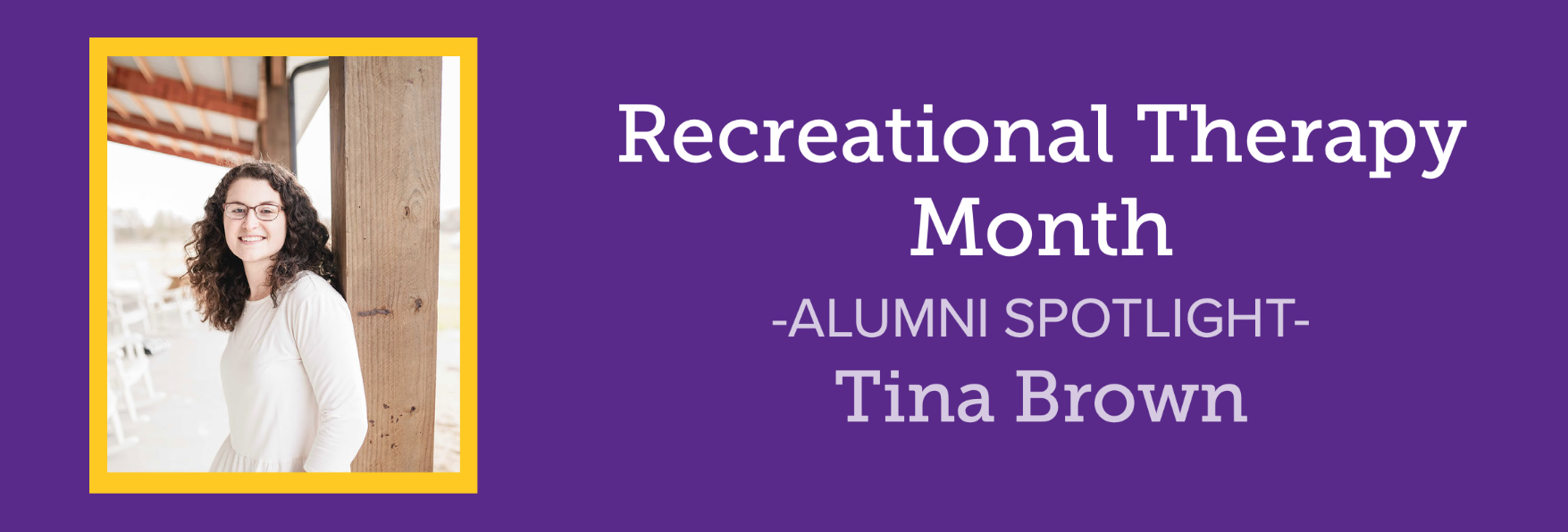Rec Therapy Month Alumni Spotlight- Tina Brown
February is National Recreational Therapy month! Join us as we celebrate all month long and catch up with current students and alumni.
Name: Tina Michelle Brown
Graduation Year: May 2016
How did you become interested in this field?
I first learned about recreational therapy at freshman orientation at ECU. I had shadowed several therapeutic professions in the past but after I researched R.T in more detail, I found it to be the most interesting and best fit for me.
What were some of your favorite recreational therapy courses while studying here at ECU?
The course that stands out to me the most was Dr. Jankes class on Geriatrics. I was captivated after learning more about the rehabilitation and therapeutic services provided to older adults. It was in this class that I realized I wanted to pursue recreational therapy in a senior care setting.
What aspects of recreational therapy do you enjoy the most?
Let’s face it, recreational therapy is just cool. As professionals, we get to dive into the lives of individuals and use their greatest passions and hobbies as a baseline for how we deliver services. With each new client, we get to explore their history, see what makes them “click”, and create opportunities where they can succeed and thrive.
Tell us about your current role with your employer?
I am the community life associate for Assisted Living and Memory Care at The Fountains at the Albemarle in Tarboro, NC.
What is a typical day (or week) like for you?
One of my favorite aspects about my job as a recreational therapist is that most days at work do not feel “typical.” I get the opportunity to explore and create new courses and experiences for my residents to enjoy each day. Since COVID, I have worn many different hats but most of my day consists of planning and providing 1:1 and small group activities.
What has been your favorite experience working in recreational therapy so far?
As a recreational therapist who works with seniors, my most interesting experiences occur when I take my residents on community outings. It is during those excursions that my education and training gets put to the test. Since starting my job in 2016, we have completed numerous trips that exceed the expectations of what seniors typically participate in. For example, we have taken residents to Bush Gardens, toured museums and watched concerts all over eastern North Carolina, including Charlie Daniels and Tony Bennett. We have also gone to football and baseball games, saw the Globetrotters play at ECU, went to a polo match, and much more. Recreational therapy has given me the confidence to push past the barriers of what is generally considered fitting for seniors so that our residents can be the happiest and most outgoing versions of themselves.
Where do you see the future of recreational therapy headed?
In my opinion, the future of recreational therapy will be what we make it. In a world now dealing with COVID, we have an opportunity to redefine and refocus who we are as a profession and where we want to be in the future. Now more than ever individuals can see how important recreational and social activities are to their overall health and well-being. Luckily for us, we are the folks that adapt and help create those meaningful opportunities.
What is the greatest challenge recreational therapists face?
I believe recreational therapists face the challenge of being overlooked by other healthcare professionals. At times, R.T is viewed as less important than other types of therapy such as occupational therapy or physical therapy because we are viewed as just the activity people. In these instances, we as recreation professionals need to have a clear understanding of what we do and who we are in order to voice and demonstrate our value in the treatment process.
What advice would give to students who wish to enter this field?
Get as many hands on experiences as you can! Volunteer with other therapists and research different career paths and populations. It is essential to learn in the classroom but our greatest learning opportunities and professional development comes when we are willing to practice what we have learned.
